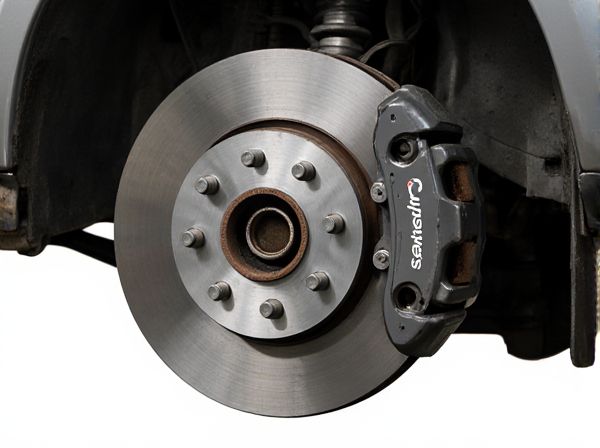
Photo illustration: Aluminum Caliper vs Cast Iron Caliper
Aluminum calipers offer lightweight performance and improved heat dissipation, making them ideal for high-performance or sporty vehicles. Cast iron calipers provide durability and cost-effectiveness, often found in standard or heavy-duty braking systems. Your choice should balance weight savings with strength and budget requirements for optimal braking efficiency.
Table of Comparison
| Feature | Aluminum Caliper | Cast Iron Caliper |
|---|---|---|
| Weight | Lightweight, improves fuel efficiency and handling | Heavier, adds to vehicle weight |
| Heat Dissipation | Excellent heat dissipation, reduces brake fade | Moderate heat dissipation |
| Corrosion Resistance | High resistance to rust and corrosion | Prone to rust and requires coating |
| Durability | Good, but can crack under extreme stress | Very durable and robust |
| Cost | Higher manufacturing cost | Lower cost and widely available |
| Performance | Better braking response and efficiency | Reliable but less responsive under high loads |
Introduction to Brake Calipers
Brake calipers are essential components in disc brake systems, responsible for squeezing the brake pads against the rotor to slow or stop a vehicle. Aluminum calipers are favored for their lightweight properties and superior heat dissipation, enhancing overall braking performance and reducing unsprung weight. Cast iron calipers, while heavier, offer high durability and cost-effectiveness, making them a common choice for standard braking systems.
Aluminum Calipers: Overview and Key Features
Aluminum calipers offer significant advantages in automotive brake systems due to their lightweight construction, which enhances vehicle performance and fuel efficiency by reducing unsprung mass. These calipers exhibit superior heat dissipation properties compared to cast iron, resulting in improved braking performance and reduced risk of brake fade under high-stress conditions. High-strength aluminum alloys provide durability and corrosion resistance, making aluminum calipers a preferred choice for high-performance and racing applications where weight savings and thermal management are critical.
Cast Iron Calipers: Overview and Key Features
Cast iron calipers are renowned for their exceptional strength and durability, making them ideal for heavy-duty braking applications in trucks and industrial vehicles. Their high thermal mass allows effective heat dissipation, reducing brake fade during prolonged or intense use. Cast iron calipers typically offer cost-effective manufacturing and robust performance under extreme operating conditions.
Weight Differences: Aluminum vs Cast Iron
Aluminum calipers weigh approximately 40-50% less than cast iron calipers, significantly reducing unsprung weight and improving vehicle handling and fuel efficiency. Cast iron calipers, while heavier, offer enhanced durability and heat resistance, often making them suitable for heavy-duty applications. Weight savings with aluminum calipers contribute to quicker suspension response and better overall driving dynamics.
Performance Comparison: Stopping Power and Heat Dissipation
Aluminum calipers offer superior heat dissipation due to their lightweight and excellent thermal conductivity, reducing brake fade during intense driving conditions. Cast iron calipers, while heavier, provide robust stopping power with greater structural rigidity, enhancing braking stability under heavy loads. The balance between aluminum's efficient heat management and cast iron's strength influences optimal performance in different driving scenarios.
Durability and Longevity of Each Material
Aluminum calipers offer lightweight construction with excellent corrosion resistance, making them less prone to rust and ideal for performance applications requiring durability under high-stress conditions. Cast iron calipers, recognized for superior strength and wear resistance, provide exceptional longevity in heavy-duty use but are more susceptible to rust and corrosion without proper maintenance. Choosing between the two depends on balancing the aluminum's lightweight advantages and corrosion resilience against the cast iron's robust durability and long-term wear resistance.
Corrosion Resistance: Aluminum Caliper vs Cast Iron Caliper
Aluminum calipers offer superior corrosion resistance compared to cast iron calipers due to aluminum's natural oxide layer that protects against rust and environmental damage. Cast iron calipers are prone to rust and require protective coatings or regular maintenance to prevent corrosion, especially in wet or salty conditions. This makes aluminum calipers a preferred choice for longevity and reduced maintenance in harsh driving environments.
Cost and Affordability Analysis
Aluminum calipers typically cost 20-30% more than cast iron calipers due to manufacturing complexities and material expenses. Cast iron calipers offer greater affordability, making them a preferred choice for budget-conscious vehicle maintenance and replacement. However, aluminum calipers provide superior weight savings and corrosion resistance, factors that may justify the higher upfront investment for performance-oriented applications.
Applications: OEM and Aftermarket Preferences
Aluminum calipers are favored in OEM applications for their lightweight properties, improving vehicle fuel efficiency and handling, and are commonly used in high-performance and luxury vehicles. Cast iron calipers dominate the aftermarket sector due to their durability, cost-effectiveness, and suitability for heavy-duty vehicles and trucks requiring robust braking performance. OEM manufacturers prioritize aluminum for innovation and weight reduction, while the aftermarket often prefers cast iron for affordability and ease of maintenance.
Choosing the Right Caliper for Your Vehicle
Aluminum calipers offer superior heat dissipation and lighter weight, improving vehicle performance and fuel efficiency, making them ideal for high-performance or daily driving applications. Cast iron calipers, known for their durability and cost-effectiveness, are often preferred for heavy-duty vehicles or those requiring greater stopping power at a lower price point. Selecting the right caliper depends on your vehicle's usage, performance needs, and budget, balancing weight, heat resistance, and longevity.
 caratoz.com
caratoz.com